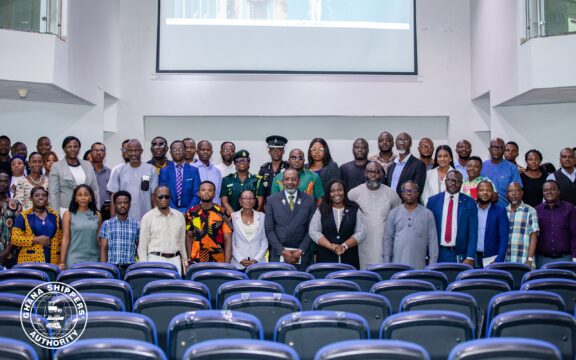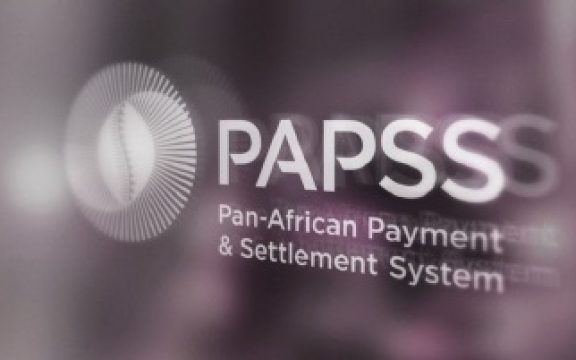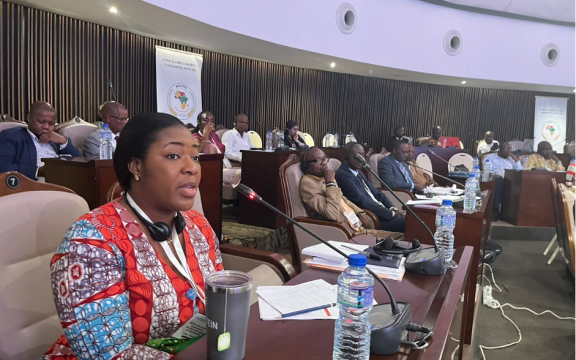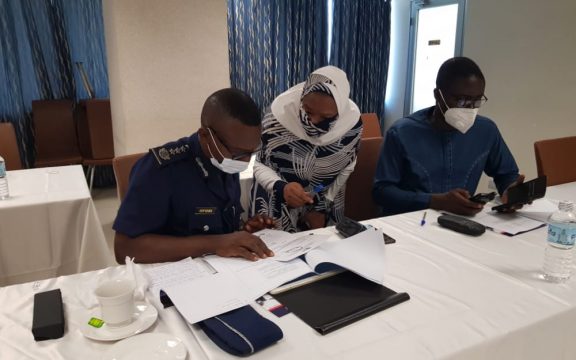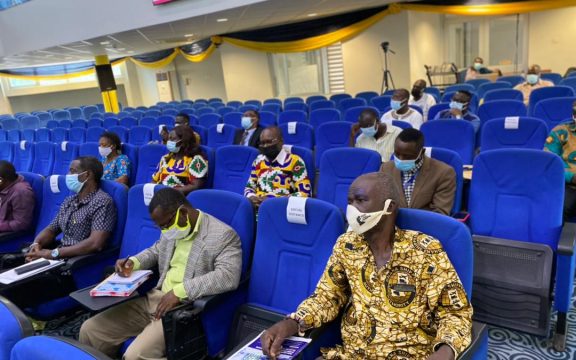The newly constituted Governing Board of the Ghana Shippers’ Authority (GSA) has been inaugurated with a strong call for the reduction in the cost of business transactions at Ghana’s ports, as part of the effort to enhance trade facilitation and position the country as a leading shipping and logistics hub in West Africa.
 At the swearing-in ceremony, held under the auspices of the Minister for Transport, Hon. Joseph Bukari Nikpe, the members of the Board were charged to harness their collective expertise to drive efficiency, eliminate operational bottlenecks, and support the government’s vision to build a 24-hour economy.
At the swearing-in ceremony, held under the auspices of the Minister for Transport, Hon. Joseph Bukari Nikpe, the members of the Board were charged to harness their collective expertise to drive efficiency, eliminate operational bottlenecks, and support the government’s vision to build a 24-hour economy.
Minister’s Charge to the Board
The Honourable Nikpe noted that persistent challenges such as high demurrage charges, the presence of multiple state Agencies at the ports, and taxes on transit cargo have significantly increased the cost of doing business in Ghana. He emphasized that these issues must be urgently addressed to maintain Ghana’s competitiveness within the African Continental Free Trade Area (AfCFTA).
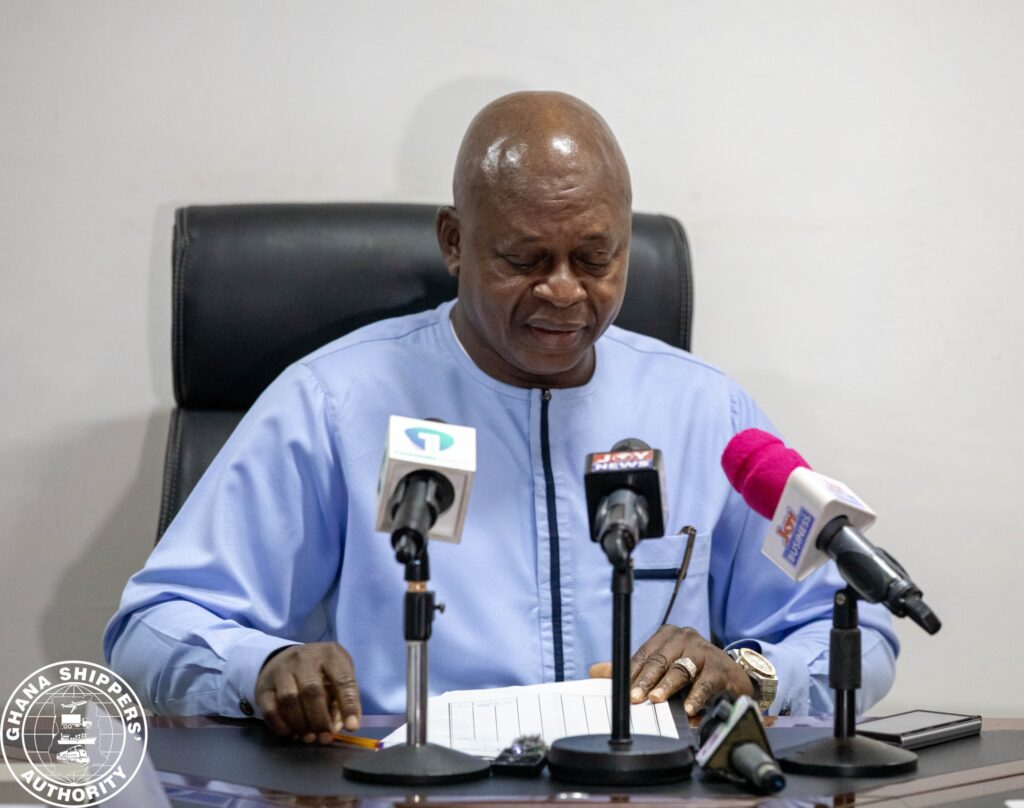 “Improving operations within the ports to reduce transaction costs is paramount. The port is a critical enabler of the government’s 24-hour economy agenda, which seeks to boost cargo throughput, expand trade volumes, and create more opportunities along the shipping and logistics value chain,” the Minister said.
“Improving operations within the ports to reduce transaction costs is paramount. The port is a critical enabler of the government’s 24-hour economy agenda, which seeks to boost cargo throughput, expand trade volumes, and create more opportunities along the shipping and logistics value chain,” the Minister said.
He further urged the new Governing Board to champion good corporate governance, efficiency, and sustainability within the shipping and logistics sector. “Let your leadership be defined by selflessness and a commitment to placing the institution on a sustainable path,” he stated.
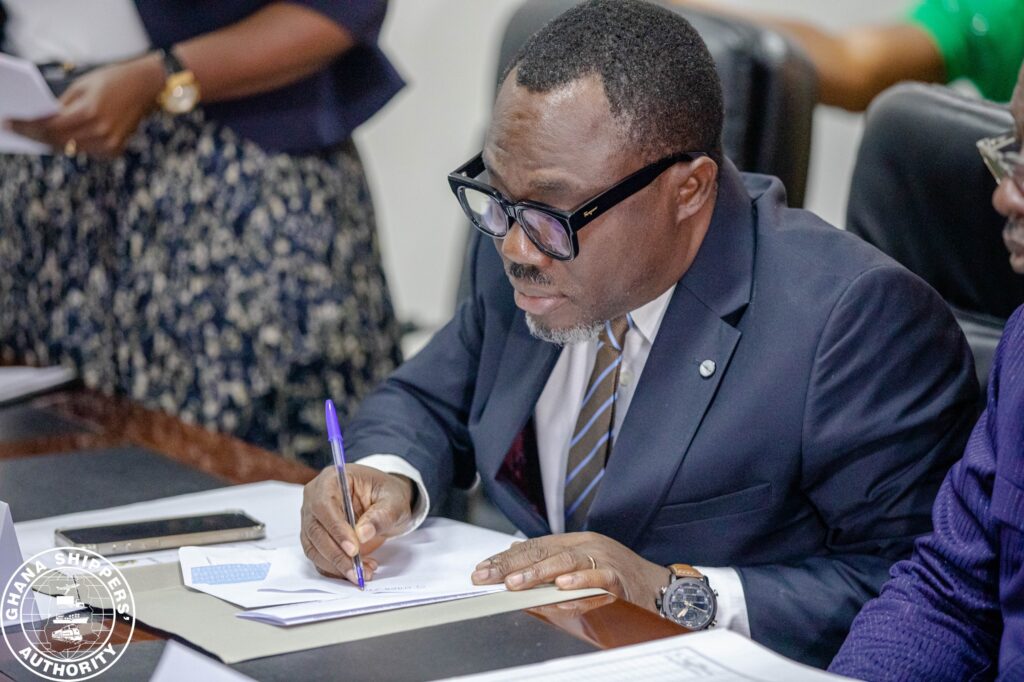
Legislative and Institutional Reforms
The Honourable Minister highlighted ongoing reforms designed to strengthen the GSA’s regulatory authority. Parliament, in July 2024, passed the Ghana Shippers’ Authority Act, 2024 (Act 1122), which empowers the Authority to regulate commercial shipping and allied services in line with modern international standards. A draft Legislative Instrument (L.I.) is currently undergoing stakeholder consultations and is expected to be presented to Parliament soon, to give full operational effect to the new Act.
“These reforms will enable the GSA to implement policies that reduce the cost of doing business at the ports, thereby making Ghana a more attractive trade and investment destination,” he explained.

Chief Director’s Call for Excellence
The Chief Director of the Ministry of Transport, Mrs. Mabel Asi Sagoe, called on the members of the Board to uphold the highest standards of corporate governance in order to enhance public service delivery. She underscored the critical role of the GSA in strengthening Ghana’s shipping and logistics value chain, and further emphasized the importance of efficiency, accountability, and transparency.
“It is vital that we remain committed to efficiency, accountability, and transparency in order to position our Transport sector as a catalyst for economic growth,” Mrs. Sagoe noted.
Chairman’s Commitment
In his acceptance remarks, the newly appointed Chairman of the Board, Mr. Mike Allen Hammah pledged to work collaboratively with his fellow Board members to uphold the highest standards of leadership, integrity, and accountability. He stressed the importance of trust, cooperation, and transparency in achieving the GSA’s strategic objectives.
Board Composition
The reconstituted Governing Board of the Ghana Shippers’ Authority comprises the following individuals:
Mr. Mike Allen Hammah – Chairman
Prof. Ransford Edward Van Gyampo – CEO / Member
Mr. Nathaniel Amonoo Wilson, Ministry of Transport – Member
Mr. Alex Mensah, Ministry of Trade & Industry – Member
Brig. Gen. Paul Seidu Tanye-Kulono, GPHA – Member
Madam Adjoa Obuobia Darko-Opoku, GACL – Member
Dr. Kamal-Deen Ali, GMA – Member
Dr. Frederick Appoh – Member
Dr. Emelia Assiakwa, GNCCI – Member
Mr. Clement Boateng, GUTA – Member
Mr. Yaw Adu-Agyei Gyamfi, AGI – Member
Madam Salamatu Fuad, CEO, Al-Sulphur Ltd – Member
Mrs. Ewurabena Aubynn, MP, Ablekuma North – Member





